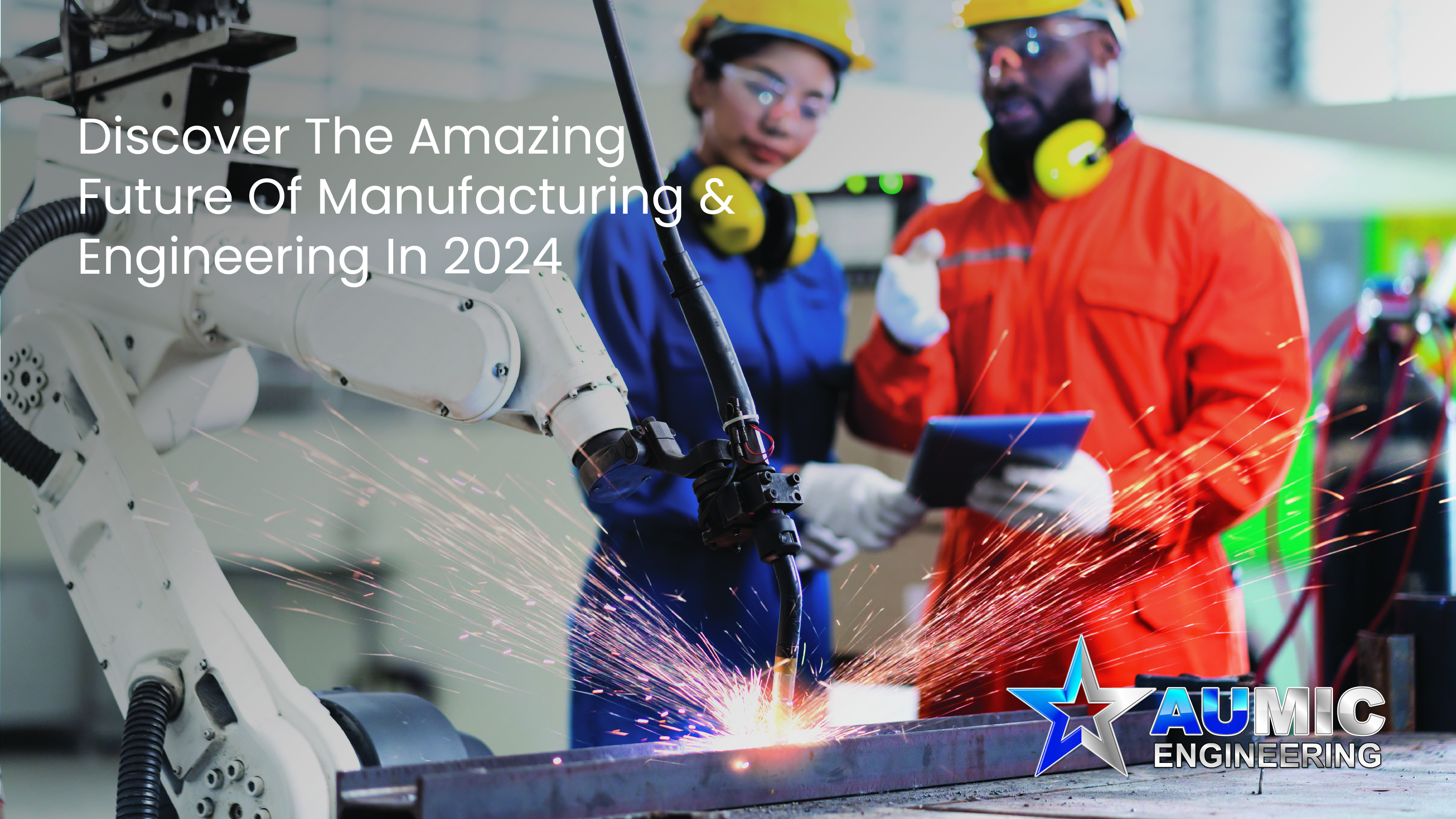As the calendar flips to 2024, a palpable sense of anticipation and excitement envelopes the manufacturing and engineering sectors, heralding the onset of a transformative era destined to redefine these industries.
This period in history is not merely a fleeting moment but a pivotal chapter in the annals of technological progress, where the boundaries of innovation are continuously expanded. The future of manufacturing, rich with the promise of groundbreaking technologies and unprecedented efficiencies, beckons us to embark on a journey.
A journey where we are not mere spectators but active architects of a world being meticulously crafted, piece by piece, innovation by innovation.
The Digital Transformation & Future Of Manufacturing
Central to this transformation is the concept of Smart Factories and the advent of Industry 4.0—a dazzling convergence of the Internet of Things (IoT) and Artificial Intelligence (AI). This fusion ushers in an era of unparalleled efficiency and connectivity. Envision future factories where machines communicate seamlessly, production lines dynamically adjust to the ebb and flow of demand, and the fusion of human creativity and robotic precision culminates in a harmonious production process. The future of manufacturing in this realm promises better production capabilities and rejuvenation of the manufacturing landscape, breathing new life into its very essence.

Simultaneously, the rise of Additive Manufacturing stands as a pillar of this new era. The allure of 3D printing, once a curious novelty, has now solidified its status as a fundamental element of modern production methodologies. This technology offers unparalleled customisation and manufacturing speed, bringing forth the ability to produce complex, durable, and lightweight components. As a result, the future of manufacturing is being reshaped, impacting diverse industries from aerospace to healthcare, and propelling them towards innovation at an unprecedented scale.
Sustainable And Green Manufacturing
In response to the planet’s clarion call for sustainability, the future of manufacturing adopts a stance of environmental stewardship. The shift towards Eco-friendly Materials and Processes transcends mere trend status, embodying a deep-seated commitment to safeguarding our Earth for future generations. Initiatives focused on recycling, resource reuse, and minimising carbon footprints help to make manufacturers sustainable.
This commitment is further exemplified by strides in energy efficiency, the adoption of renewable energy sources, and breakthroughs in energy storage technology. The future of manufacturing, therefore, is not just about innovation and efficiency; it is about doing so responsibly, ensuring that as we forge ahead, we leave a world that is not only technologically advanced but also environmentally resilient.

As Aumic Engineering stands at the dawn of this transformative era, the future of manufacturing and engineering in 2024 and beyond appears promising and revolutionary. With each advancement, we are not only reshaping the landscape of these industries but also setting a new standard for what is possible, blending the thrill of technological innovation with a steadfast commitment to sustainability and efficiency.
At the heart of all technological advancement is the human spirit. Upskilling the Workforce becomes crucial as we navigate through these changes. Emphasising STEM education and fostering a culture of lifelong learning ensures that our workforce is not left behind but is empowered to lead. Collaborative robotics exemplify the harmony between man and machine, enhancing safety and productivity while opening new avenues for human creativity.
Advanced Materials And Nanotechnology
The exploration into Advanced Materials heralds a new frontier in the future of manufacturing, where the synthesis of these materials propels us into realms previously confined to the echelons of science fiction. These materials, characterised by their unparalleled lightweight yet durable nature, are revolutionising how we think about construction, design, and functionality. Imagine structures that can withstand the test of time but also possess the ability to self-heal and adapt to environmental changes.
This innovative leap is significantly augmented by advancements in Nanotechnology, which enables precision engineering down to the atomic level. The implications of such precision are vast, promising a future where medical treatments are revolutionised through targeted drug delivery systems, and electronic devices become increasingly more efficient and compact. The future of manufacturing with its roots in these advanced materials and nanotechnologies, is set to offer breakthroughs that redefine our interaction with the material world.

The Role Of Big Data And Analytics
In the digital age, the role of Big Data and Analytics in the future of manufacturing cannot be overstated. The ability to sift through vast oceans of data to extract meaningful insights is revolutionising Predictive Maintenance and Quality Control. Real-time monitoring systems, powered by sophisticated analytics, are transforming production landscapes, enhancing the quality of outputs while ushering in unparalleled operational efficiencies and significant cost reductions.
The power of data analytics lies in its ability to preemptively identify potential issues before they become problematic, ensuring a seamless manufacturing process. In this context, the future of manufacturing is intricately linked to our capacity to leverage data for continuous improvement and innovation.
Global Supply Chain Innovations
The resilience and flexibility of global supply chains are crucial components in the future of manufacturing. The industry is moving towards a more sustainable and efficient model by reimagining supply chain dynamics through localising manufacturing processes and enhancing transparency. Blockchain technology in the supply chains introduces a new era of security, traceability, and efficiency.
This technology ensures that every transaction and movement of goods is accurately recorded and easily verifiable, promoting trust and cooperation previously unseen in the global market. As such, the future of manufacturing is deeply intertwined with the evolution of global supply chains, promising a more interconnected and reliable production and distribution.
The Future Of Design And Prototyping
The convergence of Virtual Reality (VR) and Augmented Reality (AR) with traditional design processes marks a significant milestone in the future of manufacturing. This fusion creates an immersive environment where ideas can be visualised and iterated upon in real-time, allowing for a level of interaction and experimentation that was once impossible.
Coupled with the power of AI in optimising design processes, the pathway to realising efficient and innovative solutions is clearer and more accessible.

This transformative approach to design and prototyping sets new standards in the industry, enabling a faster, more creative, and cost-effective route from concept to production.
In essence, the future of manufacturing is bringing these advancements, where the virtual and physical realms meet to bring innovations.
Looking To The Future
Looking towards the future of manufacturing and engineering in 2024, the landscape is alight with innovation and promise. This journey, fueled by the relentless pursuit of technological advancement, sustainability, and the indomitable human spirit, redefines what is possible.
As we venture forward, the future of manufacturing stands as a testament to human ingenuity and creativity, where dreams turn to reality, shaping a world brimming with limitless possibilities.
Read More
Explore Our 6 Amazing Rolling Engineering Solutions For Better Precision.

